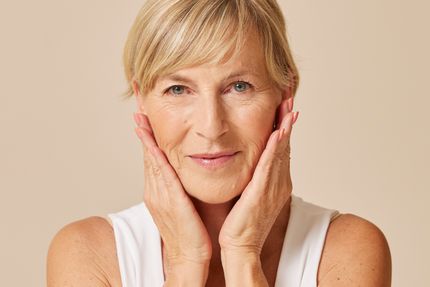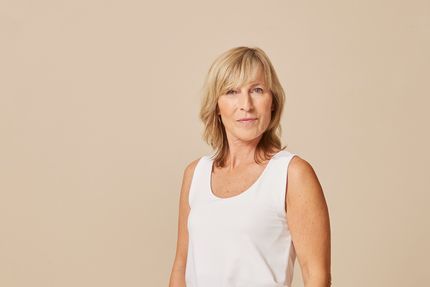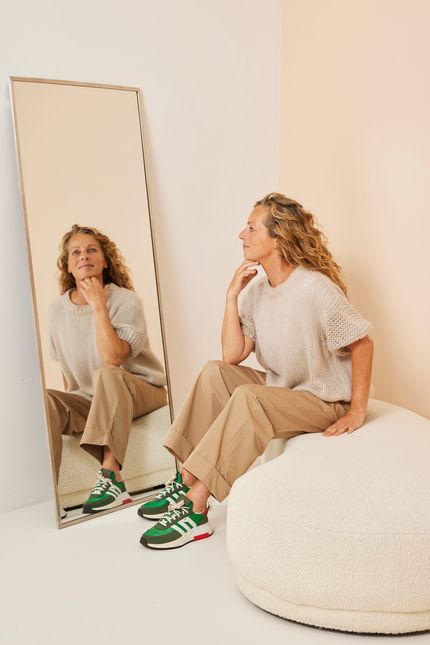

Hormones and menopause: what is happening in your body?
Your body goes through a lot of changes during menopause. This period in a women's life marks the transition from a reproductive to non-reproductive stage. Progesterone and oestrogen play a key role in your reproductive health. During the menopausal transition, the amount of oestrogen and progesterone produced declines rapidly. However, certain levels of sex hormones are still needed for your body to function. Fortunately, nature has a great solution for this.
Menopause happens because your ovaries run out of eggs. Your menopausal journey will be easier and less stressful if you understand what is happening in your body and how to take good care of yourself. This can also help alleviate your menopausal symptoms.
Your menstrual cycle, menopause and your hormones
Females are born with their entire lifetime supply of eggs. Once you start your periods, one egg develops and is released during each menstrual cycle. These cycles continue until there are no eggs left: you've reached menopause. This usually happens at the age of 51.
Two hormones, oestrogen and progesterone, play an important role in your menstrual cycle. During the first half of your cycle, oestrogen (estradiol) is produced from sacs that contain your eggs (follicles). During the second half of your cycle, when ovulation happens, progesterone is also secreted.
Women don't just go suddenly infertile when they enter perimenopause, the period of change leading up to menopause. In fact, your body works extra hard to mature the remaining eggs. This process is controlled by the brain. During perimenopause, your body makes more follicle stimulating hormone (FSH) and luteinising hormone (LH) to trigger ovulation as your ovaries release fewer eggs. The closer to menopause, the more difficult it becomes to stimulate the ovaries to mature the eggs that are still available.
In addition, during perimenopause, menstrual cycles in which ovulation does not happen (anovulatory cycles) occur at increased frequency until your periods stop altogether (menopause). When ovulation doesn't occur, your body doesn't produce progesterone at all, or very little. As a result, you may notice symptoms such as heavy bleeding, prolonged bleeding, thickening of the womb lining or uterine polyps.
Fluctuating and declining hormones during menopause
How exactly does menopause affect your hormones? When you enter the first stage, perimenopause, high oestrogen or fluctuations in oestrogen, along with low or lack of progesterone, can lead to an oestrogen dominance.
Periods will start to become less frequent over a few years before they stop altogether. The production of progesterone and oestrogen gradually declines until the ovaries stops producing these hormones altogether. Once you've gone through 12 consecutive months without a menstrual period, you've officially reached menopause and the next stage, postmenopause, begins. By this time, your ovaries are making very little oestrogen and have stopped making progesterone.
Your menstrual cycle during perimenopause
Menopause affects different women in different ways. However, most women experience similar changes in their periods:
- Stage 1: No changes in your menstrual cycle. However, you may notice the first symptoms of menopause: sore breasts, a short fuse, sleep problems or bloating.
- Stage 2: Your menstrual cycle is more irregular, shorter, and often heavier than usual.
- Stage 3: Your menstrual cycle is longer than usual. You will start skipping periods more often and periods can become lighter in flow.
- Stage 4: The final stage is the last year of menstruation, when you'll have your final menstrual period. It's normal for periods to become even less frequent compared to the previous stage. Once you've stopped menstruating for 12 consecutive months, you've officially reached menopause: you will now enter postmenopause. In the subsequent years, your body needs to adjust and restore balance.
During menopause, oestrogen and progesterone levels decrease. This is an indisputable fact. However, every body reacts differently to low levels of sex hormones. But again, every woman's menopausal journey is unique. Some women sail through menopause without hardly noticing, while others suffer from a wide range of menopausal symptoms.
The ovaries after menopause
Just because your ovaries are making very little of both oestrogen and progesterone by the time you're in postmenopause doesn't mean you don't need these hormones anymore. On the contrary! However, without a reproductive system to manage, your body doesn't need as much oestrogen and progesterone. As a result, the role of your ovaries changes after menopause.
First of all, although the ovaries stop producing oestrogen, they still continue to produce small amounts of the male hormone testosterone, which can be converted to oestrogen. Secondly, the adrenal glands take over your ovaries’ job and start producing sex hormones in lower levels. DHEA, a hormone produced in the adrenal glands, helps produce other hormones, including oestrogen and progesterone.
Support your body during menopause
Thankfully, you can give your body a helping hand to ensure your body's processes are operating optimally and reduce or eliminate menopausal symptoms. The following tips apply to all women going through menopause and postmenopause:
- Reduce stress and make time to relax. If you are coping with lots of stress your adrenal glands will prioritise stress hormone production (cortisol) over the production of sex hormones.
- Stabilise your blood sugar. Blood sugar fluctuations are a stressor that increases cortisol levels, causing a reduction in the production of sex hormones.
- Maintain a healthy diet and gut microbiome. Both play an important role in regulating the body's stress response.
- Eat 300-500 grams of vegetables each day. Vegetables contain compounds that can be utilised by gut bacteria. They are also a great source of vitamins and minerals which are involved in the conversion of hormones.
- Exercise regularly. Combine strength training with, for instance, yoga. More muscle mass is associated with insulin sensitivity, which helps balance your hormones. Yoga is good for relaxation, which is good for your adrenal glands.
Support your body
Your body is working hard behind the scenes, especially as it transitions to menopause and beyond. Give your body the support it needs.

Tips and advice


FAQ
At what age does a woman enter menopause?
The age at which a woman enters menopause varies from woman to woman. In general, it can be said that every woman enters menopause at the age of 45.










